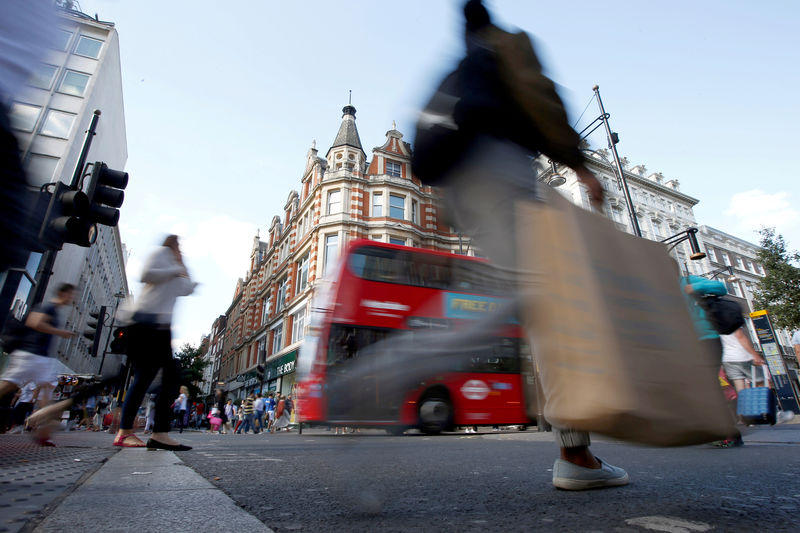By David Milliken and Jonathan Cable
LONDON (Reuters) - British retail sales unexpectedly fell in August after shoppers bought less online than the month before, when an annual promotion by Amazon (NASDAQ:AMZN) appeared to have encouraged them to splash out, official figures showed on Thursday.
The figures gave little obvious sign that either the possibility of a no-deal Brexit on Oct. 31 or a fall in sterling over the summer had dealt a visible blow to consumer spending, which has solidly supported British growth in recent years.
Monthly retail sales volumes dipped by 0.2%, the Office for National Statistics said, compared with an average forecast for a flat reading in a Reuters poll of economists and the first fall in three months.
"No cause for alarm," economist Samuel Tombs of Pantheon Macroeconomics said in a note to clients. "The modest fall in retail sales volumes does not change the overall picture of solid momentum in household spending."
British consumers appear to have largely taken the prospect of leaving the European Union in their stride, helped by weaker inflation and stronger growth in wages that are now rising at their fastest rate in more than a decade.
On Thursday the boss of Next (L:NXT), one of Britain's biggest clothing retailers, reported a rise in profits and told Reuters that disappointing sales in recent weeks appeared to reflect unusually warm weather, rather than Brexit jitters.
The category of 'non-store retailing' - predominantly online shopping - dropped by 3.2%, the biggest decline since August 2015, and came a month after Amazon held its annual 'Prime Day' promotion which helped boost sales by 7.6% the previous month.
Compared with August 2018, sales were up by 2.7%, slowing from growth of 3.4% in July and again the weakest since May. The Reuters poll had pointed to annual sales growth of 2.9%.
Looking at the three months to August as a whole, sales rose 3.3% on an annual basis, broadly in line with their average over the past year, and there was no market reaction to the data.
The figures broadly chimed with a British Retail Consortium survey that showed spending in August was flat on a year earlier, as shoppers cut non-essential spending.
But the picture is less bleak than that presented by the Confederation of British Industry, which said its members reported the biggest fall since 2008 in its gauge of retail sales in August, as sentiment crumbled in the sector.
Many businesses are more cautious than consumers as Britain's political crisis drags on, and fear that a no-deal Brexit could lead to significant disruption to imports of fresh food and other goods.
Department store and supermarket operator John Lewis said last week a possible no-deal Brexit could worsen already difficult trading conditions after first-half operating losses at the group's department stores widened and that the impact could be "significant".

Separately on Thursday the Organization for Economic Co-operation and Development said that if Britain leaves the EU without a deal, its economy was likely to be 2% smaller than otherwise in 2020-2021, pointing towards a recession, even if its exit is relatively well managed.